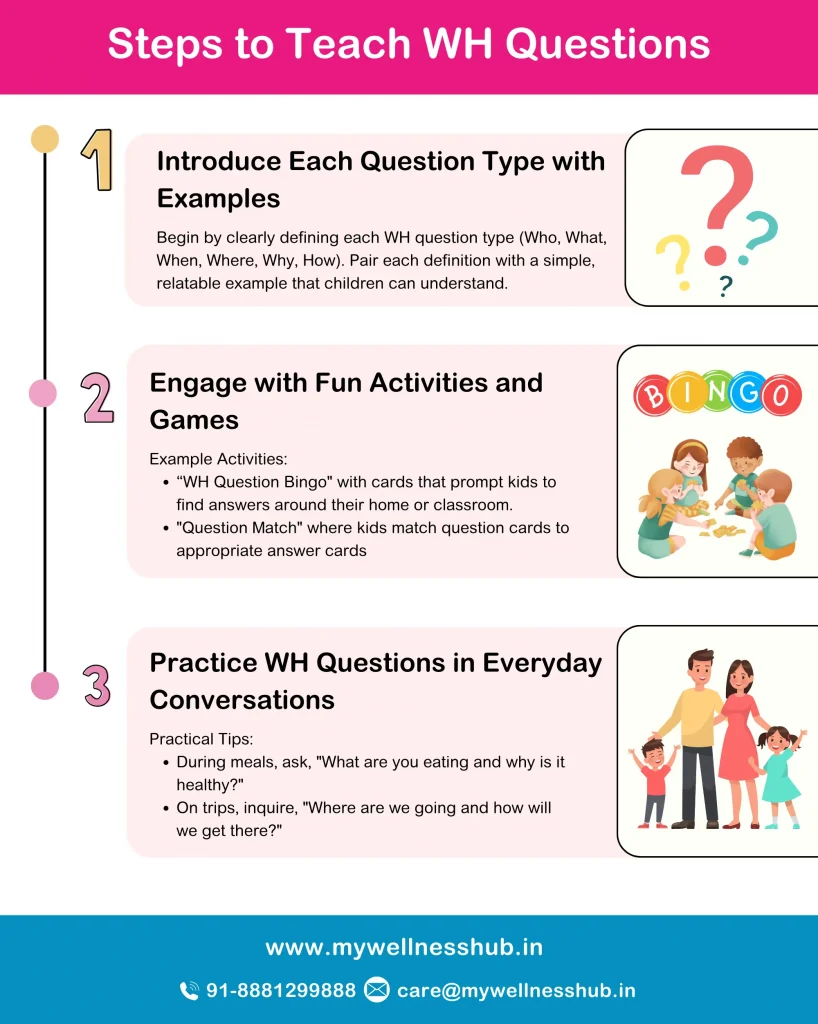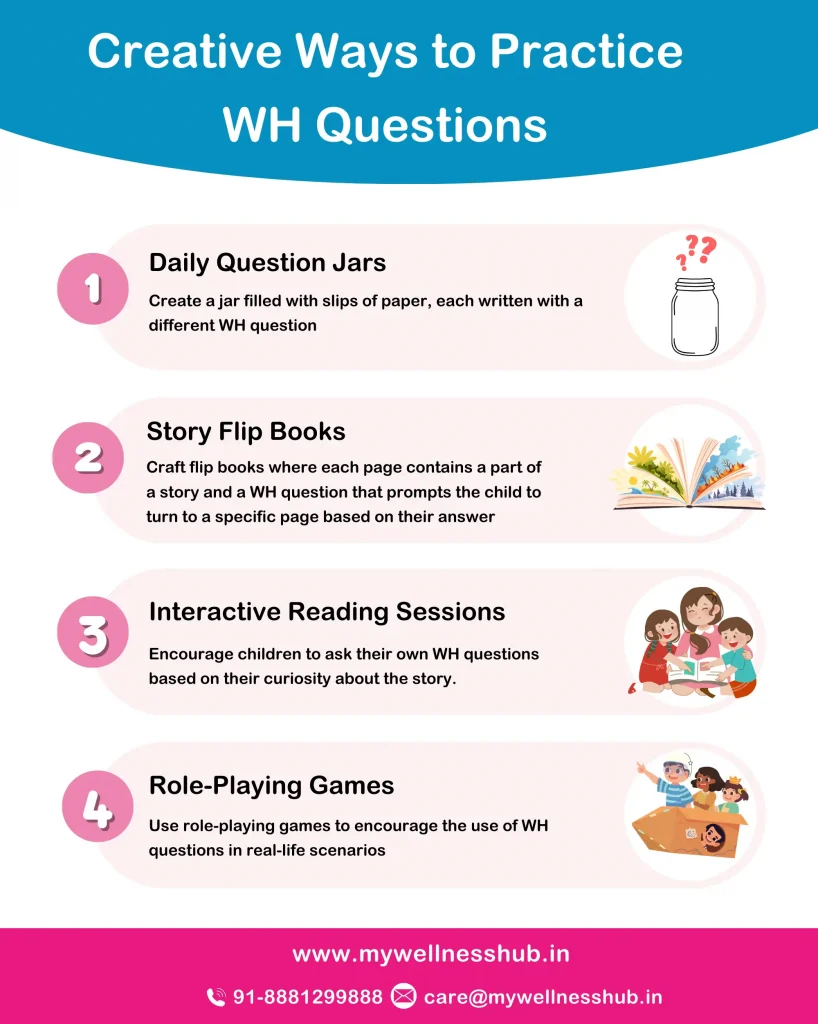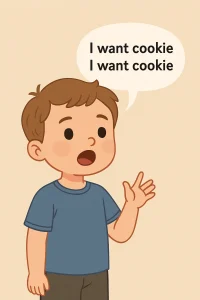WH Questions Examples for Kids: How to Teach with Fun Activities
By Rajini D
Last Updated: February 3, 2025
WH questions—like who, what, when, where, why, and how—are essential for kids to learn as they navigate their world. These questions do more than build language skills; they foster curiosity and critical thinking. Early mastery of WH questions enhances cognitive development, improves conversation skills, and boosts understanding in young learners. By integrating these questions into daily learning, we make education both engaging and interactive. Let’s explore some fun ways to teach WH questions, ensuring children are well-prepared to connect and communicate effectively.
Why Teach WH Questions to Kids?
Teaching WH questions to kids is more than a linguistic exercise; it’s a way to equip them with essential communication tools. WH questions form the foundation of engaging and meaningful conversations. By mastering questions like “What is your name?” or “Where are you going?”, children learn not only how to gather information but also how to express curiosity and empathy towards others.
The benefits of WH questions in developing communication skills are profound. They help children articulate their thoughts and inquiries clearly, fostering a sense of confidence when interacting with peers and adults. This skill is crucial in all aspects of life, from succeeding in school to maintaining personal relationships.
Moreover, the role of WH questions extends to cognitive development. These questions encourage children to think critically about the information they receive and to connect various pieces of knowledge logically. For instance, asking “Why does the sun set?” or “How does this work?” stimulates analytical thinking and problem-solving skills, which are essential for academic success and everyday decision-making.
Also read: Unlock Your Child’s Curiosity: The Power of WH Questions
Types of WH Questions and Examples for Kids
| WH Question | Definition | Example for Kids |
|---|---|---|
| Who | Asks about a person or people | “Who is your favorite teacher?” |
| What | Inquires about a thing or concept | “What is your favorite animal?” |
| When | Queries about time | “When is your birthday?” |
| Where | Asks for a location | “Where do you live?” |
| Why | Seeks reasons or explanations | “Why do we need to eat vegetables?” |
How to Introduce WH Questions to Children
Introducing WH questions to young learners can be a fun and rewarding process. Here’s a straightforward, step-by-step guide to teaching WH questions that ensures children grasp and enjoy learning these fundamental aspects of communication.

Step 1: Start with the Basics
Begin by explaining what WH questions are: questions that require more information in response than just a yes or no. Introduce one question word at a time, such as “Who,” “What,” “When,” “Where,” “Why,” and “How.” Use clear examples that are relevant to the child’s everyday experiences. For instance, while reading a story, pause to ask, “What do you think will happen next?”
Step 2: Use Visual Aids
Children respond well to visual learning. Use charts, flashcards, and pictures to help them associate question words with their meanings. Visual aids can reinforce learning by providing cues that children can recall during conversations.
Step 3: Practice with Daily Routines
Incorporate WH questions into daily routines. Ask questions like, “What do you want for breakfast?” or “Where did you put your toys?” This practice helps children understand the practical use of each question word in real-life contexts.
Step 4: Play Question Games
Turn learning into a game. Games like “20 Questions” or “Mystery Box” can make using WH questions exciting. These activities encourage children to use question words to find out information, which boosts their understanding and use of these questions in a fun setting.
Step 5: Encourage Storytelling
Encourage children to tell stories using WH questions. This can be about their day, a recent outing, or a make-believe scenario. Prompt them with questions like, “Who was there?” “What did you do?” This not only practices their use of WH questions but also enhances their narrative skills.
Tips for Making the Learning Process Enjoyable:
- Reward Curiosity: Praise children when they use WH questions correctly or when they show curiosity about learning more. Positive reinforcement can motivate them to keep using their new skills.
- Mix It Up: Use a variety of teaching methods to hold their interest. Combining books, videos, games, and interactive activities can cater to different learning styles.
- Be Patient: Allow children to answer at their own pace. Some may require more time to think about their responses, especially when they’re just starting to learn the concepts.
Interactive WH Question Games
Integrating WH questions into playtime is not only enjoyable but also highly effective for learning. Here are some fun games that seamlessly incorporate WH questions, helping children practice their new skills in an engaging way.
1. The Guessing Game
One classic game is “Guess Who?” where a child thinks of a person, and the others ask WH questions to figure out who it is. Questions like “What color hair do they have?” or “Where do they live?” make the game an excellent exercise for understanding and using different WH questions.
2. Treasure Hunt
Set up a treasure hunt where each clue involves answering a WH question to find the next hint. For example, “Where do you find food that’s cold?” The answer (“in the fridge”) leads them to the next clue. This game encourages critical thinking and the practical application of question words.
3. Story Starters
Give children a start to a story and ask them to continue it by answering WH questions. For instance, if you start with “Once upon a time, a cat found a mysterious box in the garden,” you can ask, “What was inside the box?” or “Why was the cat interested in the box?” This activity boosts creativity and the use of WH questions in narrative form.
4. Role Play
Children love role play, and it can be a fantastic way for them to use WH questions naturally. Set up a scenario, such as a doctor’s office or a grocery store, and encourage children to interact using WH questions like “How can I help you today?” or “What would you like to buy?”
5. WH Bingo
Create bingo cards with answers to various WH questions and have children ask questions to figure out which answer you’re describing. This game not only makes learning fun but also reinforces the understanding of how each WH question is used.
Making Learning Fun and Effective
Games make learning WH questions less of a chore and more of an adventure. They provide a relaxed environment where children can practice their questioning and answering skills without the pressure of a traditional classroom setting. By playing these games, children develop a natural and comfortable grasp of WH questions, which are essential for their language development and social interactions.
Examples of WH Questions for Kids
WH questions are a staple in childhood education, helping children learn how to gather information, solve problems, and understand the world around them. Here’s a list of tailored WH question examples suitable for kids, along with creative ways to practice these at home or in school.
Who Questions
- Who is your best friend?
- Who helps you when you are sick?
- Who teaches you at school?
- Who cooks food at home?
- Who brings letters to our house?
- Who takes care of animals at the zoo?
- Who do you play with at the park?
What Questions
- What is your favorite toy?
- What do we use to eat soup?
- What do we wear when it’s cold outside?
- What do bees make?
- What animal barks?
- What do we use to clean our teeth?
- What do you do when you wake up in the morning?
When Questions
- When do we eat breakfast?
- When do we go to bed?
- When do we see stars in the sky?
- When do we celebrate Christmas?
- When do we wear raincoats?
- When do leaves change color?
- When do you feel happy?
Where Questions
- Where do we keep our shoes?
- Where do birds build their nests?
- Where do doctors work?
- Where do fish live?
- Where do we go to buy groceries?
- Where do we go to watch movies?
- Where do we see lots of books?
Why Questions
- Why do we drink water?
- Why do we wear sunscreen?
- Why do we need to sleep?
- Why do birds have wings?
- Why do we say “thank you”?
- Why do we need to exercise?
- Why do we have rules?
How Questions
- How do we cross the road safely?
- How do plants grow?
- How do we turn on the TV?
- How do we build a sandcastle?
- How do we get dressed?
- How do we make a cake?
- How do we know when we are hungry?

Creative Ways to Practice WH Questions:
- Daily Question Jars
- Create a jar filled with different WH questions on slips of paper. Each day, let your child pull out a question to answer during dinner time. This not only sparks interesting conversations but also practices their use of WH questions in everyday scenarios.
- Story Flip Books
- Make simple flip books that tell a story with blanks for WH questions. As you read the story together, pause and let your child fill in the blanks with appropriate WH questions to complete the tale. For example, “___ did the dog run?” could be answered with “Why did the dog run?”
- Interactive Reading Sessions
- During reading time, pause and ask your child WH questions about the story. Encourage them to ask questions too. This activity enhances comprehension and keeps the child engaged with the material.
- Scavenger Hunts
- Organize scavenger hunts where each clue involves a WH question that leads to the next clue. This can be a fun way to incorporate movement and play into learning.
- Role-Playing Games
- Set up role-playing scenarios where your child and their friends use WH questions to figure out each other’s roles or to advance the storyline. For instance, they could play detectives asking questions to solve a mystery.
WH Question Activities for Classroom and Home
Enhancing the understanding and use of WH questions can be a fun and interactive process for kids, both in the classroom and at home. Here are some engaging activities and exercises, along with printable resources and online tools, to help reinforce this crucial learning element.
Engaging Activities and Exercises:
- WH Question Relay Race: Organize a relay race where teams answer a WH question correctly before running to the next station. This physical activity helps in retaining their attention and making the learning process dynamic.
- Create a WH Question Wall: Designate a wall or a bulletin board for posting WH questions about weekly themes or units of study. Encourage children to add their answers throughout the week, fostering a continuous learning environment.
- WH Question Journal: Provide children with a personal journal to write down one WH question they have each day and what they think the answer might be. This encourages curiosity and personal reflection on daily experiences.
- Puppet Play: Use puppets to stage plays that revolve around WH questions. Children can get involved by asking the puppets questions that drive the story forward, enhancing both their questioning skills and creative storytelling.
Common Challenges in Teaching WH Questions and Solutions
Teaching WH questions is an essential part of early education, but it’s not without its challenges. Children often face hurdles when learning how to use these questions effectively. Understanding these common obstacles can help educators and parents provide the right support to overcome them. Here’s a look at some typical challenges along with practical solutions to help young learners excel.
Challenges and Practical Solutions:
- Understanding the Function of Each Question:
- Challenge: Children may struggle to understand what information each WH question seeks.
- Solution: Use concrete examples and visual aids. For instance, use a toy box to demonstrate “What is in the box?” or a calendar to explain “When is your birthday?” This helps children connect the questions to real-world objects and events.
- Formulating Questions Correctly:
- Challenge: Young learners often mix up the structure of WH questions, leading to confusion.
- Solution: Practice through repetition and correction in a supportive environment. Role-playing games where children take turns asking and answering questions can be particularly effective. This allows them to hear the correct form repeatedly and practice in a low-pressure setting.
- Using WH Questions in Appropriate Contexts:
- Challenge: Children might know the questions but struggle with when to use them appropriately.
- Solution: Integrate WH questions into daily routines. Ask children to pose questions about activities they are involved in, like eating (“What are we eating?”), playing (“Who will play with me?”), or going out (“Where are we going?”). This reinforces the practical use of each question.
- Encouraging Depth in Responses:
- Challenge: Children may give one-word answers to WH questions instead of more detailed responses.
- Solution: Model detailed responses and encourage children to expand their answers by asking follow-up questions. For example, if a child answers, “At the park,” ask, “What did you see at the park?” or “What did you like best about the park?”
- Maintaining Interest and Engagement:
- Challenge: Keeping children engaged while learning about WH questions can sometimes be difficult.
- Solution: Turn learning into a game. Use interactive activities like treasure hunts or story dice, where children roll dice with pictures and have to ask a question about the image facing up.
Conclusion
Mastering WH questions opens up a world of understanding and communication for children, enhancing their curiosity and conversation skills. At Wellness Hub, we provide engaging resources to make learning these questions fun and effective. From interactive games to educational worksheets, our tools are designed to enrich children’s learning experiences. Dive into these activities and watch your young learners thrive in understanding the world around them. Explore more at Wellness Hub and keep the questions flowing for continuous learning and growth. Join us in nurturing curious minds—one question at a time!
Frequently Asked Questions:
1. What are WH questions?
WH questions include words like who, what, when, where, why, and how, which are used to ask for specific information.
2. Why are WH questions important for children?
Learning WH questions helps children develop their language and communication skills, enabling them to ask about and understand the world around them.
3. How can I teach WH questions to my preschooler?
Start with simple examples and use everyday situations to introduce each WH question. Make it interactive and fun to keep them engaged.
4. What are some simple games to teach kids WH questions?
Games like “20 Questions” or “Treasure Hunt” can make learning WH questions enjoyable and interactive for children.
5. Can you recommend any printable resources for WH questions?
Wellness Hub offers a variety of printable WH question cards and worksheets that are perfect for both classroom and home use.
6. How often should I practice WH questions with my child?
Regular practice, such as incorporating a few questions into daily routines, can help children master WH questions effectively.
7. What is the best way to correct my child when they use WH questions incorrectly?
Gently correct them by providing the right answer and encourage them to try again, ensuring you provide a positive and supportive learning environment.
8. Are there online tools that can help my child practice WH questions?
Yes, there are many online platforms that offer interactive quizzes and games designed specifically for learning and practicing WH questions.
9. How do WH questions enhance a child’s cognitive development?
WH questions encourage critical thinking and problem-solving skills as children learn to ask and answer questions about their surroundings.
10. What should I do if my child struggles with WH questions?
Be patient and use varied teaching methods. Visual aids, storybooks, and engaging games can make learning easier and more appealing.
About the Author:
Rajini Darugupally
M.Sc., Speech-Language Pathologist (9+ years of experience)
Rajini is a passionate and dedicated Speech-Language Pathologist with over 9+ years of experience, specializing in both developmental speech and language disorders in children and rehabilitation in adults. Driven by a desire to empower each individual to find their voice, Rajini brings a wealth of experience and a warm, genuine approach to therapy. Currently, at Wellness Hub, she thrives in a team environment that values innovation, compassion, and achieving results for their clients.
Book your Free Consultation Today
Parent/Caregiver Info:
Client’s Details:
* Error Message








